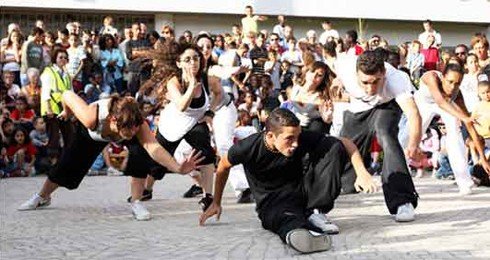"The multicultural plan [...] is a beautiful ideal of dialogue, peace and enrichment through diversity. And yet, behind this beautiful dream of interculturalism, the nightmare of fragmentation often looms up." [1] What does one has to perceive in the comments of M. Tandonnet who inspired Sarkozy's speech pronounced in Grenoble in July 2010? That North African and black immigrants have never contributed and will never contribute to French culture except by bringing about discord.
We know that in France, the relationship between culture and immigration is far from being plain and smooth. But such simplistic pictures that currently abound deserve two remarks. First of all, in order to consider the question of the destiny of interculturalism in France, one must replace immigration in its historical context and adopt a more flexible sense of geography - the history of the Italian, Spanish, Vietnamese, Chinese (etc.) contribution to the French culture goes back to the 19th Century. Dealing with the question in these terms, means considering that these African immigrations raise a problem while blithely neglecting their social contexts.
Hip-hop is a cultural movement at the crossroads of these issues. Having emerged in the suburbs twenty years ago, hip-hop is now part of French cultural heritage and of the history of contemporary dance. Virginie Maillot, urban ethnology expert and lecturer at the University Paris X-Nanterre has dedicated her thesis to Hip-hop in the French context [2]. For Babelmed, she comes back on the trajectory of the Hip-hop movement in France, from street to stage.
What are the characteristics of Hip-hop in France? Can we speak of a French Hip-hop?
Yes, exactly. The research that I have carried out is historically situated in the 1990's when hip-hop arrived in France. The situation has changed today. It is interesting to see how what is of a symbolic character in the beginning - well known people, a few photos, a style, with a few ideas, but not always - has been re-appropriated in a very precise context, the French context in this case. Even if there are common points and if hip-hop is present in the whole world today, the movement has given place to cultures that have their own characteristics according to the countries where they happen.
Like everywhere, in France, in the beginning, hip-hop has reached segregated populations - which is not the case in Japan for example. In France, youngsters have found a positive image of themselves in hip-hop. This has enabled them to come out of the categories they were assigned to and to reverse the stigma with distinction. Thanks to this movement they could positively claim themselves to be coming from the suburb areas, as immigrants and to transform what was a handicap in French society as an asset. The other distinctive characteristic is the public policy investment at the time. The State's cultural networks have played a key role in the crystallisation of the movement's French version. This is not the case in Germany where the scene is much more underground. As from the beginning of the movement, social workers have tried to seize this movement because for them this is an opportunity to approach these young boys with whom they don't manage to work in social centres, in MJC (Maisons de la jeunesse et de la culture - youth cultural centres) to start working on socialisation. Mediators and popular education activists look at this movement as a means to create social bonding. In the 1990's a lot of funds have been established in the framework of a policy of recognition of these "cultural emergences".
Later on, this policy of "integration with the means of culture" has encountered the art sectors, favouring the passage of hip-hop from street to stage and creating totally new connexions. For example, in the United State, there is a total division between "legitimate" culture, stage dance and street dance. While in France, this policy has enabled fusion.
Is this State and local authorities intervention part of the French tradition, or of the Cultural State or is it a type of social action?
It is both at the same time. In the 1990's, there's no point in deluding ourselves, all these stages that have been created in the popular suburbs to provide these youngsters with space for visibility, had a clear objective, that of social peace. It was a means through which the city's leaders imagined ways of living together by giving these young people spaces for positive recognition. Nonetheless, they did not think that hip-hop could be part of culture.
However, this is a concurrence between several things. The logic of the city's policy, the tradition of the French cultural State that goes back to post war years... the Jack Lang years that significantly broadened our conception of art...they all played an important role.
Can we speak of a political and an artistic "appropriation"?
Is it interesting to see things this way? For example today, we note that this cultural policy does not make sense anymore. It was put into question and all these connexions that used to function here do not function anymore. In an article to be published, I use the interviews that I had carried out with the group Accrorap which gave birth to the group Käfig, at different stages of their trajectory. It is obvious that these individuals, as they themselves say so, have arrived at the right time. They would have never came out of their suburbs, bright and motivated as can be, if there had not been this policy at some point together with its means, its interconnection spaces. All this made enabled these children of Saint-Priest who danced during the halftimes of LA CRO, Lyon's basketball team, to find themselves on stages like the one of the Maison de la danse etc. A few of them like Kader Attou and Mourad Merzouki have made an excellent career. They are now directors of national choreographic centres, respectively at La Rochelle and at Créteil.
La question de la récupération est donc complexe, car la stratégie de l'intégration a offert une scène de reconnaissance qui est en même temps un espace d'assignation. Pour certains, on peut en effet dire qu'il y a récupération: ils sont confrontés à des chorégraphes contemporains qui ne les reconnaissent que dans la mesure où ils laissent à la rue un certain nombre de caractéristiques de leur mouvement. L'abandon de l'improvisation et du défi pour la création chorégraphiée, notamment.
There is one of Mourad Merzouki's plays entitled Le recital (The Recital), which was codified and reinterpreted all over the world, even in China. It circulates as a play of the French repertoire. It contests with humour, hip-hop and classic concerto. We do not assist to a play that is only based on expected and recycled ideas.
A very interesting thing, especially nowadays, is that through this policy, the artistic propositions of these young people that have a different view of what France is today, of differences, of the relations between France and Algeria etc., make part of the French cultural repertoire and of the history of art.
How should we consider the question of the links between hip-hop and immigration? French hip-hop is considered to be a movement of young Black and North African immigrants with American and "Western" roots. Can we therefore say that it depends on a social and spatial logic more than on a logic principally related to culture and immigration?
It is a complex question that has evolved and continues to evolve. In the beginning, in the 1990's, in a very clear way, the young people who identified themselves with this movement were essentially young North African and Sub Saharan immigrants. They even aimed at (in Paris, in Lyon, in Marseilles) constituting gangs revolving around the same identity. This was definitely one of the identification's driving forces.
However, consequently, what is at stake is not the culture in the sense of immigrant cultural heritage. It is rather these young people's condition in French society that has nothing to do with their own cultural heritage. Their situation speaks for itself. If they identify themselves, it is also due to the fact that they happen to be in segregated districts. There is a difference that is permanently present. And hip-hop has enabled them to put this difference into value.
How would you define urban cultures?
They are cultures that emerge in an urban framework of co-presence, in a demarcated space. They can be the reinvention of cultural heritage or built on the basis of a shared social situation. The process has been analysed since the 1960's. All it takes is a few individuals that share the same living conditions and face the same problems and have common enemies for new cultural forms to emerge. They enable the individuals to get around in this environment and to give a sense to what happens to them.
What do you try to understand through your research?
I am extremely interested in the dynamics of cultural emergence in the city. For example, the question of honour in the popular suburbs interests me a lot. This issue is very controversial. I think that we have to do here with a sort of synthesis of a common cultural minimum that enables us to face a difficult social situation with a strong devaluation of individuals.
I am fascinated by the fact that the co-presence of people coming from totally different cultural horizons shapes the place's culture at a particular moment. Above all, I am interested in this proliferation, these synthesis and these reinventions. I am also interested in the institutionalisation dynamics that it can give place to. And also in what makes culture out of this ferment, in the sense of an institutionalisation, of recognition.
Maybe in France there is an immigrant art and a culture?
It is a vast subject. Immigration has fertilised French culture: the vocabulary, the cuisine, then music and cinema... The problem is the recognition of all these forms as part of the French nation. (ÇT)
Notes:
[1] Immigration: sortir du chaos. (Immigration: coming out of chaos) M. Tandonnet, Flammarion, 2006.
[2] Les fleurs sauvages de la ville et de l'art : Analyse anthropologique de l'émergence et de la sédimentation du mouvement Hip Hop lyonnais. (The savage flowers of art and the city: anthropological analysis of the emergence and sedimentation of the Hip-hop movement in Lyon) V. Milliot, 1997.
To read:
"The "French touch": le hip-hop au filtre de l'universalisme républicain", Anthropologie et sociétés, (The French touch: hip-hop at the filter of republican universalism, Anthropology and Societies) V. Milliot, 2006, vol. 30, n°2, p. 175-197.
www.erudit.org/revue/pdf
To visit:
www.kafig.com/
www.ccnlarochelle.com/









